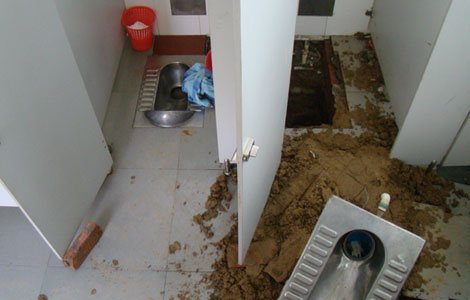 |
|
|
|
|||||||||||
Computerized allocation prioritizes patients, Shan Juan reports in Beijing.
Deng Qini was admitted to hospital with acute hepatic failure on April 22. Without an immediate liver transplant, she was likely to die within a week. The 21-year-old English major at Guangdong University of Foreign Studies, from Zhanjiang city, was wheeled into surgery the following day to undergo a liver transplant but she died 16 days after the operation.
The surgeon, Huo Feng, dean of the liver transplant center at a military hospital in Guangzhou, said Deng may have been the fastest organ recipient in the history of the hospital and, maybe, the fastest in the country. Usually, a patient has to wait at least one or two months to land a matched organ at Huo's hospital, one of 163 authorized transplant centers.
Official estimates show that about 1.5 million people on the mainland require a transplant each year, but less than 1 percent actually undergo the procedure mainly because of a severe shortage of organs.
"I didn't expect my daughter to undergo surgery so quickly, because we are just ordinary people with little money and few connections," said Deng Zhongwei, who expressed gratitude to the liver donor and those who helped with the medical bill of more than 400,000 yuan ($63,000).
Huang Hai, deputy director of the hospital, conceded that Deng might not have received the liver without a recently launched allocation system for organ donations.
The computerized system, which automatically grades all waiting patients according to a variety of factors, including the severity of the patient's condition and the time they have been on the waiting list, singled out Deng as first in line for the organ donation, shortly after her information was uploaded, recalled Li Peng, who heads the hospital's organ procurement organization.
Li's team, comprising as few as five members, works in conjunction with the local branch of the Red Cross Society of China to detect potential organ donors, mainly at intensive care units in the province. The team facilitates transplants after completing administrative procedures such as approaching potential donors, obtaining consent, removal of the organ, and its transportation.
Launched by the Ministry of Health and the Chinese Red Cross in April 2011, the system is designed to link transplant centers and OPOs nationwide.
Organs are allocated via the public voluntary deceased organ donation system among patients awaiting a transplant in an open, transparent, and fair manner, said Wang Haibo, director of the China Organ Transplant Response System Center, which also runs the allocation system.
"That works to secure fair organ allocation. Without fair allocation no one would donate," he stressed.
Currently, more than 20 factors are taken into consideration when the decision is being made as to which patient will be offered the donated organ first, said Wang.
"These were identified after long-term discussions among senior experts from the transplantation and legal fields and key health officials in the country," he said.
"Organ allocation is actually life allocation and without fair practice, no one would donate organs," he reiterated.
However, "it takes time, patience, and cooperation to really work", said Wang Ping, director of the relief and health department of the society.
According to Jiang Wenshi, data analyst at the COTRSC, by January about 30 OPOs had filed donor information and organ allocation data in the system.
By the end of December, more than 50 livers had been allocated via the system, however during the same period the Chinese Red Cross had recorded 85 donations, with the 35 extra organs likely to have been donated outside the remit of the allocation system, said Wang Ping. "Some allocations obviously were conducted under the radar," he said.
At present, the system is only open to directors of transplant centers rather than patients, but the process is under the supervision of the health authorities and the Chinese Red Cross.
"The introduction of the system could somewhat help to redress the situation and prompt open, transparent, and fair allocation," according to Wang Haibo. However, he admitted that it's not an easy job and will take time to settle down, given that it represents a major change to the current mechanism and the entire landscape of organ allocation.
Since transplants were first performed in China in the 1970s, organ allocation has been mainly hospital-based, and insiders revealed that a lack of supervision had created loopholes that allowed some people to jump to the front of the line.
Wang Haibo conceded that transplant doctors on the mainland were facing external forces, such as pressure from powerful, wealthy people with the right connections, when deciding who should receive an organ donation.

|

|

|

|

|

|